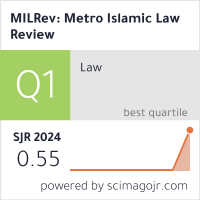The Comparative Study of the Protection of Women's Rights in Article 463 of the New Criminal Code with Law Number 36 of 2009 Concerning Health Perspective of Jaser Auda
DOI:
https://doi.org/10.32332/milrev.v2i2.7824Keywords:
Abortion, New Penal Code, HealthAbstract
This research wants to see how Article 463 in the New Criminal Code accommodates and protects the interests and rights of women's reproductive health. In addition to analyzing how it accommodates women, this study also analyzes how Article 463 of the New Criminal Code is viewed from the perspective of Jaser Auda's Maqashid Syari’ah. Before entering into the analysis, this research first compares Article 463 with the Health Law and the Law on criminal acts of sexual violence. This research uses normative legal research methods using a statutory approach or statute approach. Data sources are obtained from literature including laws and regulations and other internet sources. Primary data sources in this study are Article 463 of Law Number 1 of 2023 concerning the New Criminal Code and Law Number 36 of 2009 concerning Health. The theory used is comparative legal theory and Jaser Auda's Maqashid Syari’ah theory as an analysis knife in solving problems. The results showed that Article 463 of the New Criminal Code compared to the health law is more accommodating to women's interests is the health law because it more broadly explains what is included in sexual violence which is not only focused on three dimensions, namely forced prostitution, rape and sexual slavery. In addition, in terms of considering the health of pregnant women, the health law is more accommodating because it provides exceptions to abortion for pregnant women who have emergency health conditions that endanger themselves and their babies. In Jaser Auda's perspective, this article is not in line with Maqashid Syari’ah because it does not interpret wisdom and justice for all universally, in this case, the woman.
Downloads
References
Downloads
Published
Issue
Section
License
Copyright (c) 2023 Ihwan Sormin, Zezen Zainul Ali

This work is licensed under a Creative Commons Attribution-ShareAlike 4.0 International License.










